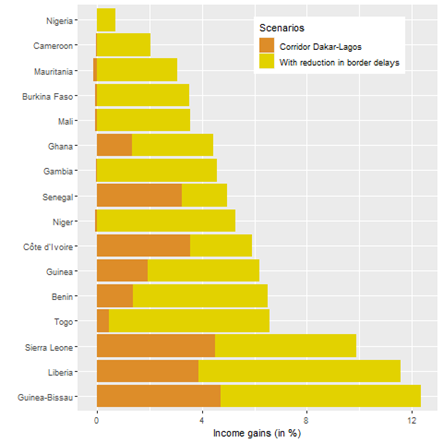The potential of regional trade in Africa remains largely under-exploited. Trade between African countries currently represents only 12% of total economic activity in the region, compared to 60% in Europe and 40% in Asia. In this context, the new agreement on the African Continental Free Trade Area (ACFTA) offers a unique opportunity to take Africa’s regional trade to the next level — and, by extension, to boost economic growth and job creation across the continent.
To make this happen, one key priority is to improve the efficiency of cross-border transport. Carrying goods from one African country to another is often a lengthy and expensive process, due in part to the insufficiency of road and rail networks , the still modest role of regional maritime transport, as well as prohibitive border crossing times. Regional integration requires better roads, but also calls for less red tape at border crossings.
To improve our understanding of this issue, a recent research paper from the World Bank Infrastructure Chief Economist’s Office, "Corridors without Borders in West Africa,” analyzes the economic impacts of several regional road corridors, including the Dakar-Lagos motorway corridor, which connects the capitals of all the coastal nations of West Africa. The results clearly demonstrate the importance of packaging hard investments in road infrastructure with soft reforms to improve trade facilitation.
The World Bank has been working in this direction since 2010 through a $228-million project to modernize transport and customs infrastructure along the Abidjan-Lagos Corridor , a first step that has made it possible to reduce border crossing times and improve the quality of the roads. A new $470-million project that will promote regional integration and economic opportunities in Burkina Faso, Niger, and Togo has just been launched.
What are the economic gains from improving major road corridors in West Africa?
Simulations based on a spatial quantitative general-equilibrium model quantify the subnational and aggregate gains from major transport investments in West Africa. As shown in figure 1, the modernization of the Dakar-Lagos regional road corridor would bring considerable economic benefits in relation to the investment costs, with a benefit-cost ratio estimated at around 3.
The estimated gains come from a better integration between the main coastal economies, but especially from a better integration of all the internal markets along the corridor with the big economies such as Nigeria, Ghana, and the Ivory Coast. Better road infrastructure reduces transport costs, makes it easier for businesses to reach internal and external markets, and helps consumers access a greater diversity of goods at lower prices. As shown in the study, the potential impacts on the economy are manifold. Business sales and productivity increase, with positive effects on profits and wages. For households, higher income and lower prices also translate into a higher purchasing power.
What are the benefits of reducing border delays?
Improving road quality is not enough. In West Africa, border crossing formalities can be slow and complicated. Many border checkpoints are located in the very heart of cities, causing traffic jams, pollution and major delays that affect both the local population and international transport operators.
The multiple bureaucratic formalities — often involving customs, police, and other law enforcement agencies — force truck drivers to stop several times, with border crossing times that can range from a few hours to several days. Given that the Dakar-Lagos corridor crosses a total of 11 international borders, the cumulative border crossing times between Dakar and Lagos are estimated at 160 hours, which is more than half of the total travel time. In other words, truckers traveling between major African cities on the west coast often spend more time waiting at borders than driving to their destination.
The research demonstrates that, if road investments were coupled with a sharp reduction in border crossing times, the economic gains linked to the modernization of the Dakar-Lagos corridor could be multiplied by two.
Which countries would benefit the most?
The magnitude of economic gains varies considerably along the corridor. Our study estimates that Nigeria, which is already the largest economy in West Africa, would see a relatively modest 1% of extra income from the corridor. Other countries on the western side of the corridor would enjoy much more substantial gains, as the corridor would bring them closer to the Nigerian market and other significant economies such as Cote d’Ivoire and Ghana.
Small and fragile countries on the eastern side of the corridor — such as Guinea-Bissau, Liberia, and Sierra Leone — would also benefit considerably, with income gains of up to 5-6% without border improvements, and 10-12% if border improvements are also achieved (see figure 1 above).
_____________
You can access all the previous Infra4Dev blogs here.





Join the Conversation